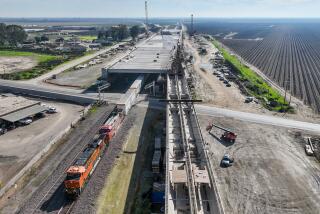91 Freeway Project’s Funds in the Balance
- Share via
The California Transportation Commission is expected to decide today whether to approve $34 million in additional funding for the massive interchange improvement project where the Pomona and Riverside freeways meet.
If the money is not guaranteed, the $312-million freeway project, in the works for more than a decade, will probably be put on hold for a couple of years, local transportation officials said.
State transportation officials said rejection of the funding is unlikely because the revamped interchange is critical to relieving congestion in the growing Inland Empire.
“I won’t go so far as to say it’s a no-brainer ... [but] as I see it, I think it has got an excellent shot,” said state Commissioner Joe Tavaglione, president of Tavaglione Construction and Development Inc. in Riverside. “As far as I’m concerned, around the county and the state, this is the No. 1 high priority.”
The state commission is scheduled to vote on the funding today in Sacramento.
Ron Roberts, chairman of the Riverside County Transportation Commission, which is overseeing the interchange improvements, said he is optimistic now that state lawmakers have reached a budget deal.
“Now that the budget is signed, I feel more comfortable that we can work this out,” said Roberts, who is also mayor of Temecula.
The project will expand the 60, 91 and 215 freeways to five lanes in each direction, adding carpool and auxiliary lanes and a truck bypass. The interchange will be reconstructed to ease transitions. According to Caltrans, this will allow the freeways to accommodate 250,000 vehicles a day by 2020. Right now, the interchange handles about 100,000 vehicles daily.
The project will largely be funded by bonds that the state will issue next year but faces a $34-million shortfall. Riverside County Transportation Commission officials earlier this year offered to chip in up to $7.5 million and looked to the California Transportation Commission to make up the rest.
But the lack of a budget hampered the state panel’s ability to approve funding for new projects. Now, though the state spending plan has been approved, the state transportation commission still doesn’t know how much money it has in its coffers and won’t find out until next month, said Diane Eidam, executive director of the state commission.
If the state commission fails to approve the additional funding today, a multiyear delay is almost assured because planning and construction are on such a tight timetable.
The project is one of 12 in California that uses “design sequencing,” which allows Caltrans to put a contract out to bid and begin preliminary work before the project is fully planned. If all goes according to plan, this reduces the amount of time and money spent because more work can be done simultaneously. But there is little room for error.
Putting the project on hold would be “catastrophic,” said Eric Haley, executive director of the county commission.
“In the midst of our very dramatic growth and growing job base, this is just an absolutely essential component,” he said.
Because of that, local transportation officials have proposed an alternative: Local transportation dollars would be used to fund the construction up front, and the California Transportation Commission would pay back the money in three years. The money would come from sales-tax funds that are earmarked for projects later in the decade.
“We will provide all of the cash necessary to move this forward, and they will pay us back a very large portion of it in fiscal year 2006-07,” Haley said. “There is obviously an element of risk and faith in this process, but all of the parties know that allowing all of our progress just to stop is a very big disservice to the public.”
Eidam said the loan is the only way to keep the project on track.
“We’re not in a position to make any allocation at this meeting,” she said. “That’s really about the only thing we can do to keep that project going.”
What remains uncertain is how much of the loan would be repaid in light of the local transportation commission’s offer to chip in $7.5 million. Haley and others are hopeful that the state commission will agree to pay back $31 million, reducing the local contribution to $3 million.
“The question is how much of the $34 million are we going to get back and when. Those are the things we’re wrestling with,” he said.
More to Read
Sign up for Essential California
The most important California stories and recommendations in your inbox every morning.
You may occasionally receive promotional content from the Los Angeles Times.














